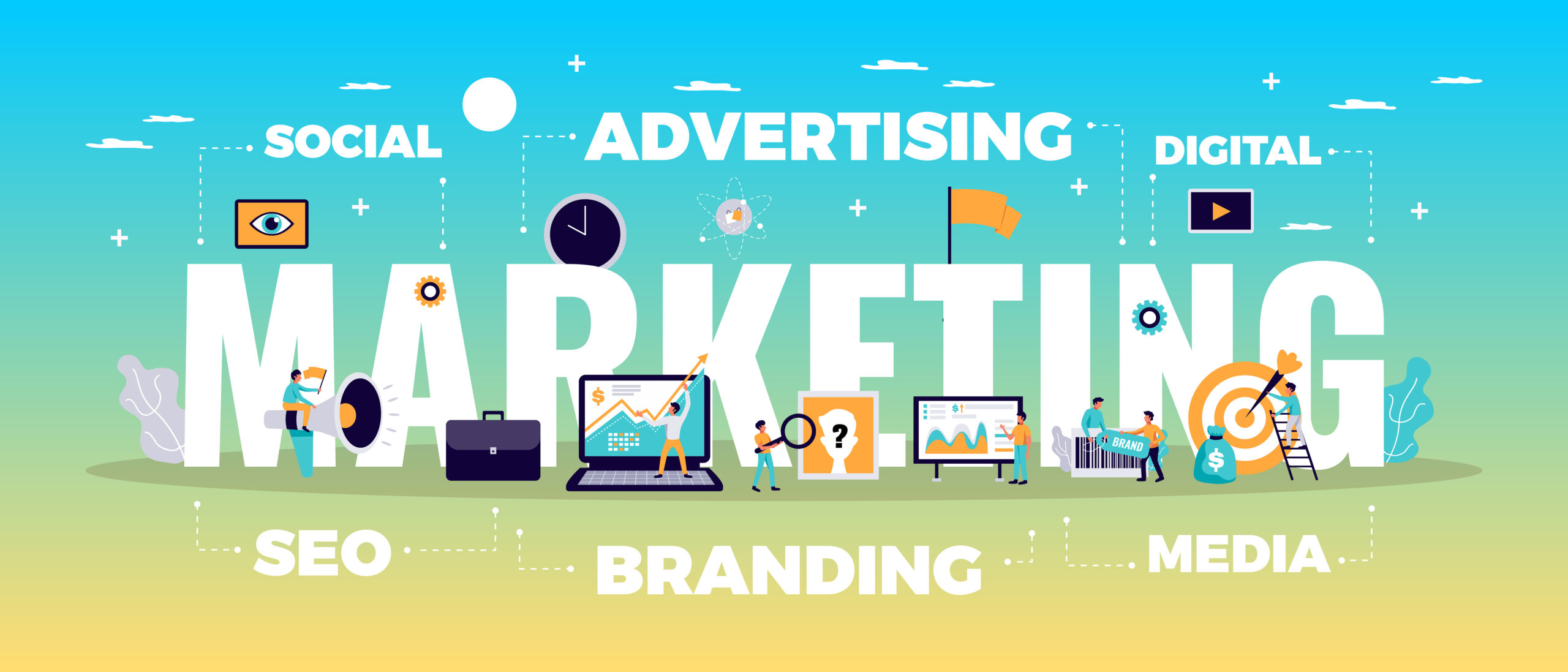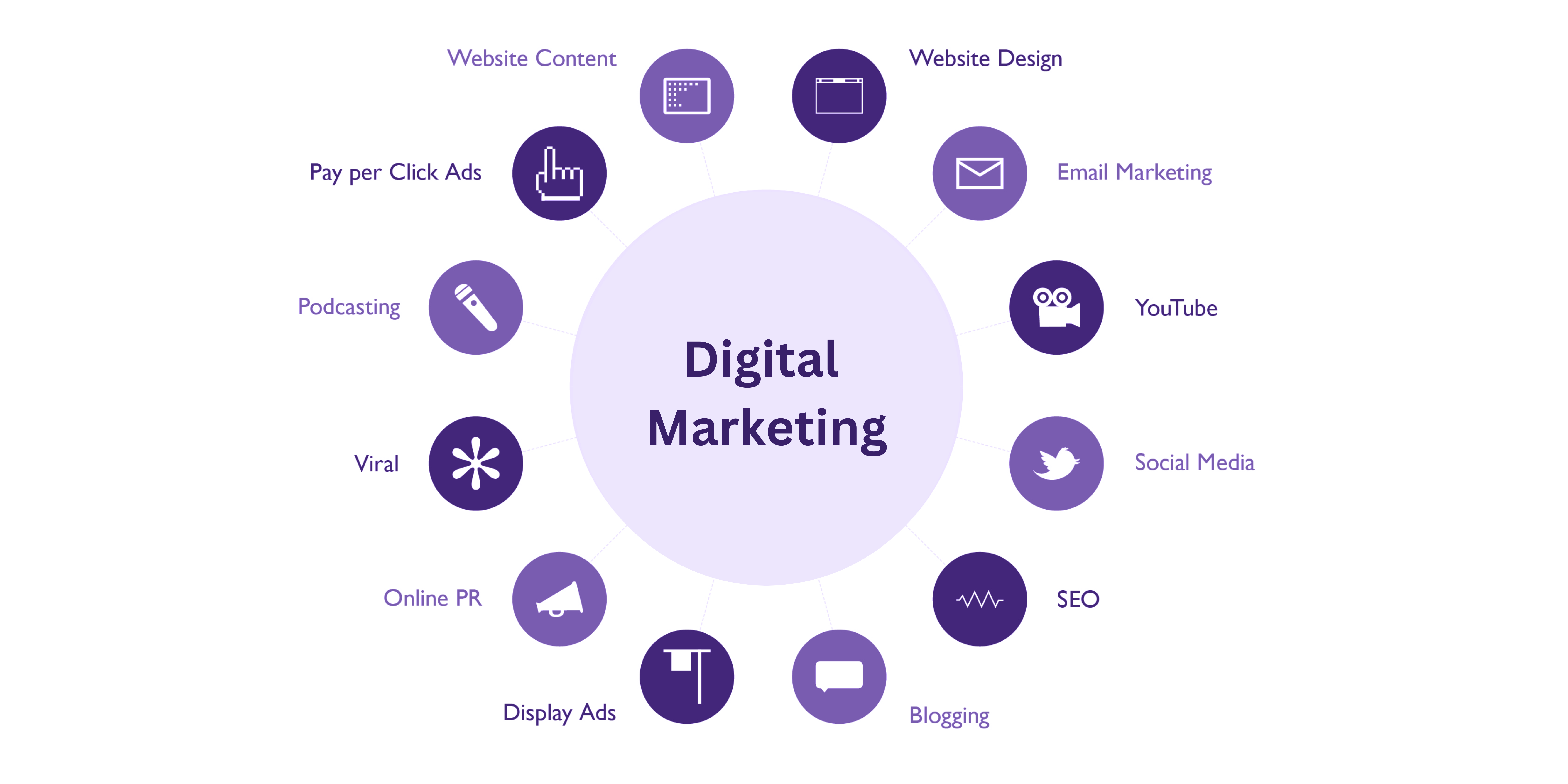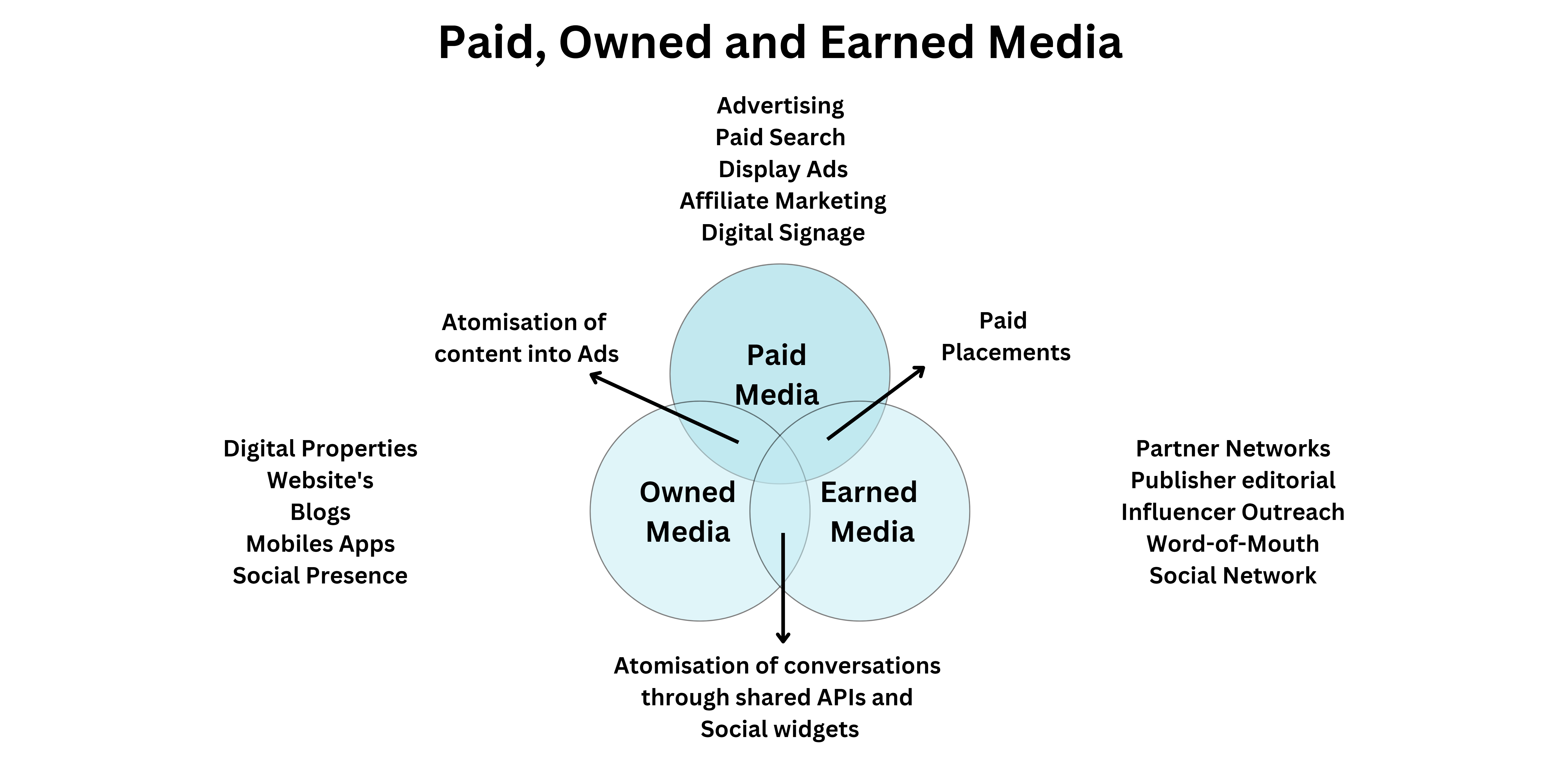
History of Digital Marketing
Digital marketing has evolved significantly since the birth of the internet in the 1990s. Here is a brief overview of its history:
The 1990s: The first digital banner ads appeared on websites, and companies started to create their own websites to market their products and services.
In the early 2000s: Search engine optimization (SEO) emerged as a way for websites to improve their search engine rankings and gain more visibility online. Email marketing also became more popular during this time.
The mid-2000s: The rise of social media platforms like Facebook, Twitter, and LinkedIn changed the way businesses approached digital marketing. Companies started to create profiles on these platforms to engage with customers and promote their brands.
The late 2000s: Mobile marketing became more important as smartphones became more prevalent. Companies started to create mobile-friendly websites and develop mobile apps to reach customers on the go.
The 2010s: The rise of video content and influencer marketing changed the digital marketing landscape. Companies started to create more video content to engage with customers, and influencer marketing emerged as a way for brands to partner with popular social media personalities to promote their products.
The present: Digital marketing continues to evolve with the emergence of new technologies like artificial intelligence, virtual reality, and voice search. Personalization and customer experience have become key priorities for businesses as they seek to connect with customers in a more meaningful way.
What is Digital Marketing?
Digital marketing refers to the promotion of products or services through digital channels such as search engines, social media, email, mobile apps, and websites. It has become an essential part of modern-day marketing as more and more people are using digital platforms to search for products and services.
Digital marketing encompasses a wide range of tactics and strategies, including search engine optimization (SEO), pay-per-click (PPC) advertising, social media marketing, email marketing, content marketing, influencer marketing, and more. The goal of digital marketing is to reach a targeted audience, generate leads, and convert them into customers or clients.

Some Key Facts about Digital Marketing
Digital marketing spending is growing rapidly: In 2021, global spending on digital marketing is expected to reach $389 billion, which represents a 17.1% increase from 2020.
Mobile devices are increasingly important: Mobile devices such as smartphones and tablets are becoming the primary way people access the internet. As a result, mobile optimization is crucial for digital marketing success.
Video content is becoming more popular: Video is an effective way to engage with the audience and convey a message. By 2022, online videos will make up more than 82% of all consumer internet traffic.
Personalization is key: Personalization is essential in digital marketing as customers expect tailored experiences. Personalized emails and product recommendations, for example, can increase conversions and customer satisfaction.
Social media is a major player: Social media platforms such as Facebook, Instagram, and Twitter have become essential marketing channels for businesses. In fact, 73% of marketers believe social media marketing has been “somewhat” or “very” effective for their business.
SEO is still important: Search engine optimization (SEO) is a crucial aspect of digital marketing. 93% of all online experiences begin with a search engine, and businesses that rank higher in search results are more likely to attract leads and conversions.

Key Performance Indicators (KPIs) are metrics used to evaluate the success of a digital marketing campaign. Here are some common KPIs used in digital marketing:
Website Traffic: The number of visitors to a website is an important KPI as it shows how well a digital marketing campaign is driving traffic to a website.
Conversion Rate: This KPI measures the percentage of website visitors who take a desired action, such as filling out a form, making a purchase, or subscribing to a newsletter.
Cost Per Acquisition (CPA): CPA measures the cost of acquiring a new customer or lead. This KPI is important as it helps to determine the effectiveness of a digital marketing campaign in terms of cost.
Return on Investment (ROI): ROI measures the return on investment for a digital marketing campaign. It compares the cost of the campaign to the revenue generated from it, providing insight into the profitability of the campaign.
Social Media Engagement: This KPI measures the level of engagement on social media platforms, such as likes, comments, and shares. It helps to determine the effectiveness of social media marketing campaigns.
Email Marketing Open and Click-Through Rates: These KPIs measure how many people open and click through emails sent as part of an email marketing campaign. They help to determine the effectiveness of email marketing campaigns.
Search Engine Ranking: This KPI measures the position of a website in search engine results pages (SERPs). It helps to determine the effectiveness of SEO campaigns in driving traffic to a website.

Digital Marketing Concepts
Digital Marketing is a broad term that encapsulates a number of marketing efforts that cater specifically to digital channels. The digital marketing is all about leveraging all the available digital channels such as social media, emails, and search engines which involves the following steps:
- Attract a customer
- Make him a regular visitor
- Convert him as a lead
- Turn him to the customer
- And, then use it for promotion
There are Two Main Pillers of Digital Marketing
- Online Marketing
- Offline Marketing
Online Marketing
Online marketing, also known as digital marketing, is the practice of promoting products, services, or brands through various digital channels. This includes tactics such as search engine optimization (SEO), pay-per-click (PPC) advertising, social media marketing, email marketing, content marketing, and more.
The goal of online marketing is to attract and engage potential customers through digital channels, and ultimately, to drive more sales and revenue for a business. Unlike traditional marketing methods, online marketing allows businesses to reach a wider audience at a lower cost and with more measurable results.
Offline Marketing
Offline marketing, also known as traditional marketing, refers to any marketing efforts that don’t rely on digital channels. These can include a variety of tactics such as print advertising, billboards, radio or television ads, event sponsorships, direct mail, and more.
Although digital marketing has become increasingly popular in recent years, offline marketing can still be an effective way to reach certain audiences and achieve marketing goals. For example, print advertising can be useful for targeting older or less tech-savvy audiences, while event sponsorships can help businesses build brand awareness and connect with potential customers in person.
Types of Digital Marketing
There are several types of digital marketing that businesses can use to reach their target audience and achieve their marketing goals. Some of the most common types of digital marketing include:
- Search Engine Optimization (SEO)
- Search Engine Marketing (SEM)
- Social Media Marketing(SMM)
- Pay-Per-Click (PPC)
- Affiliate Marketing
- Content Marketing
- E-Mail Marketing
Search Engine Optimization (SEO)
Search Engine Optimization (SEO) is the practice of optimizing a website or web page to increase its visibility and ranking in search engine results pages (SERPs) for targeted keywords or phrases. The goal of SEO is to improve the quality and quantity of organic traffic to a website from search engines.
SEO involves a combination of technical and creative elements that are designed to make a website more search-engine friendly. This includes optimizing the website’s content, structure, and code to make it more accessible and relevant to search engines. Other tactics that are commonly used in SEO include keyword research, link building, content creation, and on-page optimization.
The benefits of SEO include increased visibility and traffic to a website, improved user experience, and higher conversion rates. However, SEO can be a complex and constantly evolving field, and it requires ongoing attention and effort to achieve and maintain results.
The most important elements to consider when optimizing a web page for search engine includes:
- Keyword Research
- On-Page Optimization
- Technical SEO
- Link Building
- User Experience
- Level of user Engagement
- Quality of Content
- Mobile-Friendly
- Analytics and Reporting
By focusing on these important elements of SEO, you can help to improve your website’s visibility and ranking in search engine results pages, drive more organic traffic to your site, and ultimately achieve your online marketing goals.
Search Engine Marketing (SEM)
Search Engine Marketing (SEM) is a type of digital marketing that involves promoting websites and web pages through paid advertising on search engine results pages (SERPs). The goal of SEM is to drive traffic to a website by placing ads in front of users who are actively searching for products, services, or information related to your business.
SEO, on the other hand, is focused on optimizing website content and structure to improve organic search engine visibility. This includes optimizing meta tags, headings, content, and other on-page elements, as well as acquiring high-quality backlinks to the website from other sites.
Both PPC advertising and SEO can be used together to create a comprehensive search engine marketing strategy that can help businesses increase their visibility, drive more traffic, and achieve their online marketing goals.
There are several key elements to a successful search engine marketing (SEM) campaign, including:
- Keyword Research
- Ad Copywriting
- Landing Page
- Bidding and Budget Management
- Performance Tracking and Analysis
By focusing on these elements of SEM, businesses can create effective search engine marketing campaigns that drive more traffic, generate leads, and increase revenue.
Social Media Marketing (SMM)
Social media marketing (SMM) is a type of digital marketing that involves using social media platforms to promote products or services and engage with a target audience. The goal of social media marketing is to build brand awareness, increase website traffic, and drive conversions.
The most popular social media platforms for marketing include Facebook, Instagram, Twitter, LinkedIn, and YouTube. Each platform offers unique features and advertising options that can be used to reach specific target audiences.
The key elements of a successful social media marketing campaign include:
- Strategy
- Content Creation
- Advertising Community Management
- Analytics and Reporting
By focusing on these key elements, businesses can create effective social media marketing campaigns that drive engagement, build brand awareness, and ultimately generate revenue.
Pay-Per-Click (PPC)
Pay-per-click (PPC) is a type of online advertising in which advertisers pay each time a user clicks on one of their ads. The most common platform for PPC advertising is Google Ads, which allows businesses to display their ads in search engine results pages (SERPs) and on other websites that participate in the Google Display Network.
PPC advertising typically involves bidding on specific keywords related to your business, and creating ad campaigns and ad groups with targeted messaging and ad copy. One of the most common types of PPC is search advertising and because Google is the most popular search engine, many businesses use Google Ads for this purpose.
The key elements of a successful PPC campaign include:
- Ad Quality
- Keyword Relevance
- Landing Page Quality
- Bid Amount
PPC Ads are then placed at the top of search engine result pages based on the factors above whenever a person searches for a specific query.
Affiliate Marketing
Affiliate marketing is a digital marketing tactic that lets someone make money by promoting another person’s business. You could be either the promoter or the business that works with the promoter, but the process is the same in either case.
Affiliate marketing is a type of online marketing where a business pays a commission to an affiliate for promoting its products or services. Affiliates promote the products or services of the business and earn a commission for each sale, lead, or action generated through their unique affiliate link or code.
The key elements of a successful affiliate marketing program include:
- Finding and recruiting affiliates
- Offering attractive commission rates
- Providing high-quality promotional materials
- Tracking and reporting
- Communication and support
Affiliates also benefit by earning commissions for promoting products or services they believe in and recommending to their audience.
Content Marketing
As mentioned, the quality of your content is a key component of an optimized page. As a result, SEO is a major factor in content marketing, a strategy based on the distribution of relevant and valuable content to a target audience.
The key elements of a successful content marketing strategy include:
- Blog Posting E-Books
- Newsletters
- Whitepapers Infographics
- Video or Audio Transcripts
By focusing on these key elements, businesses can create effective content marketing strategies that build brand awareness, establish thought leadership, and drive profitable customer action over time.
E-Mail Marketing
E-Mail Marketing is a digital marketing strategy that involves sending promotional messages, newsletters, or other marketing materials to a list of email subscribers. The primary goal of email marketing is to promote a product or service drive traffic to a website or build brand awareness.
First of all, you have to make sure that your emails are wanted. This means having an opt-in list that does the following:
- Individualizes the content, both in the body and in the subject line
- States clearly what kind of emails the subscriber will get
- An email signature that offers a clear unsubscribe option
- Integrates both transactional and promotional emails
E-Mail marketing is a proven, effective technique all on its own: 89% of surveyed professionals named it as their most effective lead generator.
The Benefits of Digital Marketing
Digital marketing has become prominent largely because it reaches such a wide audience of people. However, it also offers a number of other advantages that can boost your marketing efforts. These are a few of the benefits of digital marketing.
- Increase Brand Awareness
- Improve Targeting and Segmentation
- Higher Conversion Rates
- Cost-Effective
- Real-Time Analytics
- Increased Customer Engagement
- Increase Revenue
Frequently Asked Questions
Digital marketing is the promotion of brands to connect with potential customers through the internet. It involves brands using digital communication channels such as search engines, social media, email, websites, and AI to promote their products. For example, ecommerce brands can promote and sell their products through social media.
Digital marketing offers several benefits, including increased brand visibility, targeted marketing, measurable results, and cost-effectiveness. It allows you to better understand your customers, to reach them more effectively, and to build a strong, loyal following.
YES! If you want your ecommerce business to stay competitive in 2023, then you need to be investing in all the latest digital marketing tools and technologies. This includes embracing new technologies like AI and VR to promote your brand.
You need to be skillful in writing content along with communication skills to effectively tell your product’s story to your consumer base. Data analytics skills are important for understanding how well your marketing campaigns and other online skills are a must.
You can improve your search engine rankings through SEO techniques such as keyword research, on-page optimization, and link building. Read our blog What is On-Page SEO? to learn more about how to improve your SEO.
Yes! Word of mouth can be great, but a majority of consumers find and research companies online before making any purchases. An online presence gives your company credibility and boosts brand awareness. Plus, websites are an avenue for endless marketing strategies, including e-commerce, online customer service, and consumer engagement.
Conclusion
digital marketing is an ever-evolving field that requires constant learning and adaptation. As a marketer, it’s essential to stay up-to-date with the latest trends, tools, and techniques to create effective campaigns that reach the target audience.
It offers a range of channels and tactics that allow for more precise targeting, interactivity, measurability, cost-effectiveness, and agility. By leveraging digital marketing, businesses can build stronger relationships with customers, improve brand awareness and reputation, and drive sales and revenue. By leveraging various digital marketing channels, such as social media, email marketing, SEO, PPC, and content marketing, marketers can create a holistic strategy that drives results. Digital marketing blogs are an excellent resource for gaining insights, tips, and strategies to enhance your skills and stay ahead of the competition.
